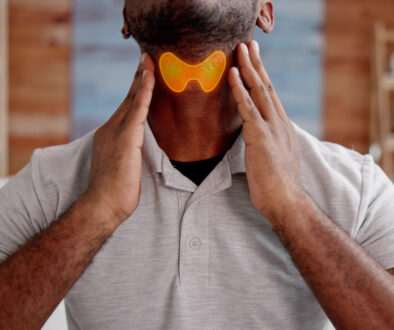Looking Beyond the Surface: Causes of Thyroid Eye Disease
While bulging eyes are the signature sign of thyroid eye disease, they aren’t the only symptom. You may notice that your eyes are gritty and watery. Perhaps you’ve even experienced double vision. If that’s the case, then it’s important to schedule an appointment with your provider to see if you have this condition.
We’ll take a closer look at thyroid eye disease, or TED, including its causes, treatments, and what it feels like.
What Triggers Thyroid Eye Disease (TED)?
The key to TED centers around immune cells. When they attack the thyroid, they can produce antibodies that stimulate this gland. As a result, too much thyroid hormone is created, which can also cause the swelling and inflammation commonly seen in TED.
This is not the only condition that can trigger TED. Other factors include:
- Genetics: Some are more predisposed to the condition.
- Smoking: If you already have TED, smoking can make the situation worse.
- Age and Gender: Thyroid eye disease is most common in women, and while it can affect those of any age, it is most common among those who are middle-aged
- Viral Infections: Infections such as those involving the respiratory system or the Epstein-Barr virus can cause or worsen TED.
- Excessive Iodine: Whether you receive additional iodine through food or medication, this can contribute to the development or worsening of thyroid eye disease.
- Thyroid Diseases: Conditions such as Graves’ disease, hyperthyroidism, and Hashimoto’s thyroiditis can cause or contribute to TED
You can read more about thyroid disorders on our blog, including this overview of what the thyroid does and a list of common thyroid disorders.
Can You Fix Thyroid Eye Disease?
There are several treatments available for TED, but your recovery depends upon many factors. You must schedule an appointment with your physician if you believe you have signs of TED—this can help minimize any eye damage.
For some with very mild cases of TED, the eyes may return to normal, while others with more advanced cases may require surgery. For more advanced cases, your physician would work closely with an ophthalmologist, who specializes in maintaining healthy eyes and the treatment of eye conditions.
Treatments typically focus on:
- Medications
- Correcting underlying thyroid problems
- Corticosteroids
- Symptom management
It’s very important to remember that TED is often chronic—meaning you’ll need to be consistently monitored by your physician in Raleigh.
What Does Thyroid Eye Disease Feel Like?
As we mentioned earlier, watery, dry, and gritty eyes can be a sign of TED. But because many conditions share those same symptoms, it’s vital to get an accurate diagnosis from one of our internal medicine physicians in Raleigh.
TED can also cause blurry or double vision and pain when you move your eyes. Any time you have changes in your vision, it’s imperative that you contact your healthcare provider.
What Are the Stages of Thyroid Eye Disease?
There are essentially two main stages of thyroid eye disease:
The Acute or Active Stage
This stage is marked by inflammation and can last anywhere from one to two years. During this phase, the focus is on treating the condition, alleviating symptoms, and stopping progression to minimize eye damage.
Inactive Stage
This stage occurs after the inflammation has subsided, and the symptoms are alleviated. However, it’s during this phase that the patient is evaluated to see if the eyes have any permanent structural damage.
What Is the Relationship Between Graves’ Disease and TED?
Graves’ disease is an autoimmune disease, meaning the immune system mistakenly attacks healthy cells. It causes the thyroid to produce too much hormone, resulting in hyperthyroidism. Just because you have Graves’ disease, doesn’t mean you’ll automatically develop TED. However, one-third of those with Graves’ disease do go on to develop TED, according to information from the Cleveland Clinic.
TED is also referred to as Graves’ ophthalmopathy.
A Better Outlook for a Healthier Future is on the Horizon With Raleigh Medical Group
The thyroid is a small gland, but any issues can cause problems. While some problems may be mild, others may be more bothersome, affecting your quality of life.
As internal medicine physicians in Raleigh, we’re keenly aware of how all your body’s systems work together and how an issue with your thyroid can have a domino effect on other aspects of your health.
If you’re exhibiting any of the symptoms we’ve listed above, or even if you’re just looking for a new medical home, we’d consider it a privilege to care for you. Simply contact us for an appointment.




